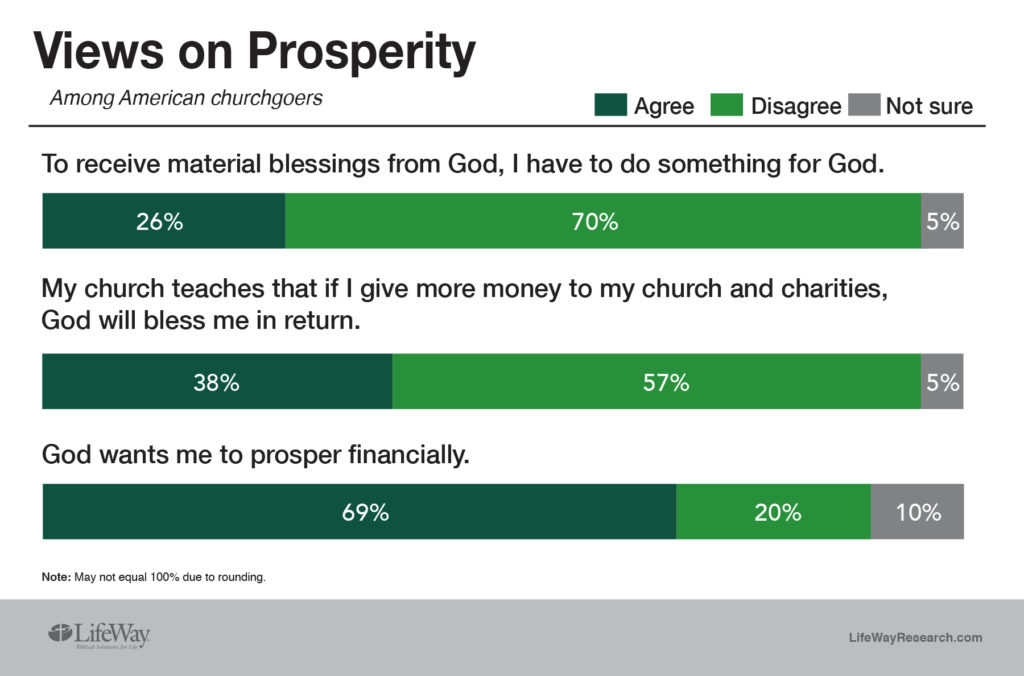For some Americans, dropping a check into the offering plate at church is a bit like having a Discover Card.
Both offer a cash-back bonus.
About a third of Protestant churchgoers say their congregation teaches that God will bless them if they donate money.
Two-thirds say God wants them to prosper. One in 4 say they have to do something for God to receive material blessings in return.
Those are among the key findings of a new study on “prosperity gospel” beliefs from Nashville-based LifeWay Research, which surveyed 1,010 Americans who attend a Protestant or nondenominational church at least once a month.
Researchers found more than a few churchgoers believe giving to God leads to financial rewards, said Scott McConnell, executive director of LifeWay Research.
“A significant group of churches seem to teach that donations trigger a financial response from God,” said McConnell.
A controversial topic
The belief that God gives financial rewards in exchange for offerings is a central part of the so-called prosperity gospel, which offers a “direct path to the good life,” as Duke professor Kate Bowler puts it.
That belief is both controversial and fairly commonplace.
LifeWay Research found 38 percent of Protestant churchgoers agree with the statement, “My church teaches that if I give more money to my church and charities, God will bless me in return.” Fifty-seven percent disagree, including 40 percent who strongly disagree. Five percent are not sure.
Pentecostal and Assemblies of God churchgoers (53%) are most likely to agree. Churchgoers with evangelical beliefs (41%) are more likely to agree than those without evangelical beliefs (35%).
African-American (51%) and Hispanic churchgoers (43%) are more likely to agree than white churchgoers (32%).

Even if they don’t see a direct link between offerings and blessings, many churchgoers say God wants them to do well.
Sixty-nine percent agree with the statement, “God wants me to prosper financially.” Twenty percent disagree. Ten percent are not sure.
The more people go to church, the more likely they are to think God wants them to do well. Among those who attend at least once a week, 71 percent say God wants them to prosper financially. That drops to 56 percent for those who go to church once or twice a month.
Churchgoers who have evangelical beliefs (75%) are more likely to agree God wants them to prosper than those without evangelical beliefs (63%). Pentecostal and Assemblies of God (80%), Baptist (74%), nondenominational (67%) and Methodist churchgoers (65%) are among the most likely to agree.
Lutherans, however, are more skeptical. Just under half (49%) say God wants them to prosper financially.
Blessings linked to action
Some churchgoers draw a direct tie from their actions to God’s blessings.
One in 4 (26%) agree with the statement: “To receive material blessings from God, I have to do something for God.” Seventy percent disagree. Five percent are not sure.
Southerners (30%) are more likely to agree than those who live in the Midwest (20%) or West (19%). African-American (44%) and Hispanic (34%) churchgoers are more likely to agree than white churchgoers (17%) or those from other ethnic groups (16%).
Pentecostal/Assemblies of God churchgoers (34%), Methodists (29%) and Baptists (28%) are more likely to say they have to do something for God to get a material reward than other denominations. Lutherans (12%) are less likely.
A previous LifeWay Research study on American theological views found similar results. In that study, 1 in 4 Americans said they believe God will always reward true faith with material blessings. Americans who hold evangelical beliefs were most likely to agree with that statement.
McConnell said evangelicals appear to be to the most eager to embrace a link between God’s financial blessings and their actions.
“A number of high-profile evangelical leaders have condemned the prosperity gospel,” he said. “But more than a few people in the pews have embraced it.”
For more information on this study, visit LifeWayResearch.com or view the complete survey report PDF.
Bob Smietana is senior writer for Facts & Trends.
Methodology:
LifeWay Research conducted the study Aug. 22–30, 2017. The survey was conducted using the web-enabled KnowledgePanel®, a probability-based panel designed to be representative of the U.S. population. Initially, participants are chosen scientifically by a random selection of telephone numbers and residential addresses. People in selected households are then invited by telephone or by mail to participate in the web-enabled KnowledgePanel®. For those who agree to participate but do not already have internet access, GfK provides at no cost a laptop and ISP connection.
For this survey, a nationally representative sample of U.S. Protestant and nondenominational adults (18 and older) who attend religious services once a month or more often was selected from the KnowledgePanel®.
Sample stratification and base weights were used for gender, age, race/ethnicity, region, metro/non-metro, home ownership, education and income to reflect the most recent U.S. Census data. Study-specific weights included for gender by age, race/ethnicity, region and education to reflect GSS 2016 data. The completed sample is 1,010 surveys. The sample provides 95 percent confidence that the sampling error does not exceed plus or minus 3.1 percentage points. Margins of error are higher in sub-groups.
Evangelical beliefs are defined using the NAE/LifeWay Research Evangelical Beliefs Research Definition based on respondent beliefs. Respondents are asked their level of agreement with four separate statements using a four-point, forced-choice scale (strongly agree, somewhat agree, somewhat disagree, strongly disagree). Respondents are categorized as having evangelical beliefs if they strongly agree with all four statements:
- The Bible is the highest authority for what I believe.
- It is very important for me personally to encourage non-Christians to trust Jesus Christ as their Savior.
- Jesus Christ’s death on the cross is the only sacrifice that could remove the penalty of my sin.
- Only those who trust in Jesus Christ alone as their Savior receive God’s free gift of eternal salvation.
LifeWay Research is a Nashville-based, evangelical research firm that specializes in surveys about faith in culture and matters that affect churches.










